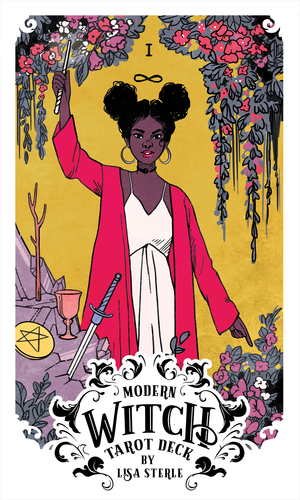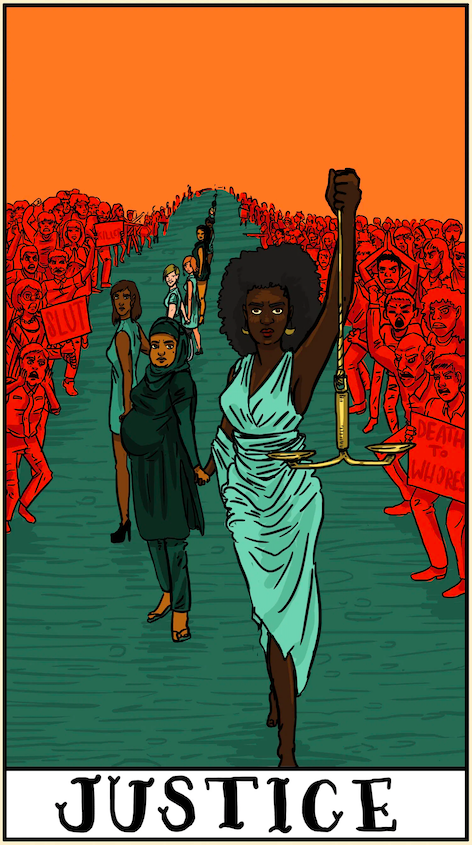
TWH – Last August, the African American writer, thinker and activist Adrienne Maree Brown posted The Lovers tarot card from the Muse deck to her 200,000 Instagram followers. Putting women front and center, the Muse deck reimagines the standard tarot deck with lush imagery and diverse faces. In the lead up to the 2020 U.S. election, Brown continued to draw cards for her community not as an act of divination, but rather as a collective conversation around how to navigate a fraught and turbulent time. The conversation was nuanced and authentic, and was supported by cards drawn from a range of decks that featured a rich diversity of images – as diverse and multi-faceted as that of Brown’s own community.
Going back to the original decks from the early modern period, tarot cards have mostly featured white and heteronormative characters, and the contributions of women to some of the most popular decks were erased. While Arthur Waite and Aleister Crowley’s work on the Rider-Waite and Thoth decks, respectively, was widely acknowledged, until recently the actual illustrators of the decks, Pamela Colman Smith and Lady Frieda Harris, were often ignored.

The Magician card from the Modern Witch Tarot [Lisa Sterle]
Times have changed. As a vibrant open source creative platform, in recent times the tarot world has seen an emergence of a range of decks that not only show diverse communities but also challenge the narratives, archetypes and function of the conventional decks. From the vibrant colours of the Modern Witch Tarot created by Lisa Sterle to the feminist deck Our Tarot from Sarah Shipman, which features 78 iconic history-making women, women and gender nonconforming tarot deck creators are offering readers the tools to revolutionize their practice.
On her site Brown Girl Tarot, Amanda Michelle Jones has collected a library of tarot decks that were either created by or feature people of color. Of the 35 decks featured, one of the most striking is the Asian American Tarot, created by the Asian American Literary Review as part of their Open in Emergency mental health project.

The Refugee card from the Asian American Tarot, part of the Open in Emergency project [Asian American Literary Review]
Launched in 2016, Open in Emergency reimagines the standard deck using images that speak to the specific experience of the Asian American community. For Lawrence-Minh Bùi Davis, the editor of The Asian American Literary Review, and guest editor, Mimi Khúc, the intention was that cards like The Refugee and The Model Minority would pave the way for a robust conversation within the community around mental health and healing, using a platform steeped in empathetic representation. The cards are poignant, personal, and also universal. After selling out the first two editions, the cards are once again available for sale, offering up a much needed resource at a critical time.
For Cuban American artist Cristy C. Road, creating the Next World Tarot was a labor of love and also a source of healing. To create the deck, Road went deep into her community, photographing friends and exploring ways to embody their essence, strength, and identity through the cards. It was also a way to explore a particularly traumatic time for the community and connect their experiences to a higher truth. Alongside that she chose to explore her own lived experience and to draw on the rich and complex spiritual community that she grew up amongst.
This deck doesn’t pull any punches – the Next World Tarot is pure resistance. Challenging not only body image and identity, the deck also confronts capitalism and colonialism, doing so within a framework of the ancient divination tools that are woven into the Santeria practices that Road was immersed in as a child. With such layered and complex images, the deck encourages the reader to take their time and fully explore the obvious and subliminal meanings that arise from the cards.

The Justice card from the Delta Enduring deck [Egan]
While Road’s deck puts the iconography of a diverse New York front and center, the Delta Enduring deck, created by Louisiana-based artist Egan, is a love letter to the southern U.S. This is a deck underpinned by rich intersectionality that speaks to the diverse people that make up their community. Much has been made of Egan’s choice to depict the devil card in the form of a police cruiser, and this is certainly emblematic of the way in which they root the narrative so deeply in their community’s lived experience. Yet there is also a tenderness in Egan’s handling of such introspection. In this deck, the Strength card depicts a trans woman washing the dishes. “A lot of the time strength is people going on with their daily lives despite things being really shitty,” Egan says, “or despite the world hating you or thinking you shouldn’t exist.
“Depicting a trans woman enjoying her life and listening to music and doing her own dishes is a depiction of strength that we could all aspire to,” Egan continued.
Similarly, complexity and authenticity shine through the Dust II Onyx deck, created by Courtney Alexander. As a Black tarot deck creator, Alexander conceived her deck “as a love offering to the people of the Black diaspora.” Alexander’s striking artwork incorporates mixed media collage paintings that integrate metallic and holographic foils and reflect “the deepest essence of Blackness and what it means to be Black as a race.”
As an artist, Alexander radiates a strong entrepreneurial spirit, and it is clear that Dust II Onyx is deeply embedded in her portfolio as a working artist. But for Alexander, it has also become a tool for supporting other Black artists and people of color. Using both her platform and emerging publishing company, she is exploring ways to bring artists and healers together.
Like Adrienne Maree Brown, these artists have used their artistic practice and their exploration of the tarot world as a tool for engaging, amplifying, and empowering their own communities and offering up empathetic and inclusive tools for the broader tarot world.
Fiona Leonard is an Australian author and playwright and is the Artistic Director of Düsseldorf-based, Blue Goat Theatre which she founded in 2018 to promote original works in English and to foster inclusive and representative theatre. Her plays have been performed in five countries and in two languages.
The Wild Hunt is not responsible for links to external content.
To join a conversation on this post:
Visit our The Wild Hunt subreddit! Point your favorite browser to https://www.reddit.com/r/The_Wild_Hunt_News/, then click “JOIN”. Make sure to click the bell, too, to be notified of new articles posted to our subreddit.